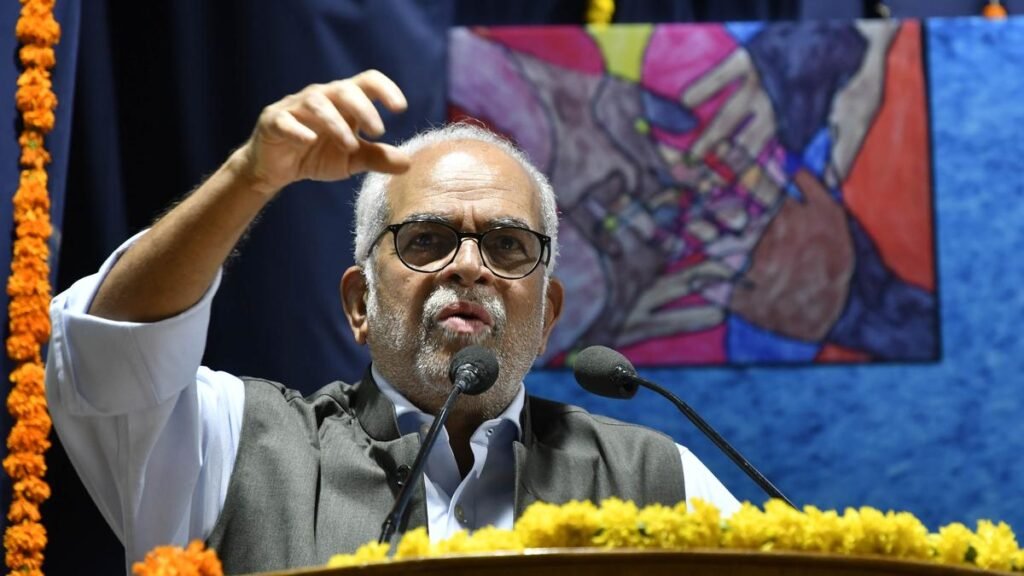“Read the judgement and then speak,” says INDIA bloc’s V‑P pick

The Salwa Judum judgement debate flared again after Amit Shah linked the 2011 ruling to prolonged Naxalism, prompting Justice B. Sudershan Reddy’s pointed rebuttal grounded in constitutional limits and accurate reading of the verdict. In his view, the Salwa Judum judgement never obstructed counterinsurgency; it barred outsourcing lethal force to vigilantes, which undermines law and legitimacy. Therefore, the Salwa Judum judgement remains a boundary on method, not an injunction against the state’s duty to fight insurgents.
“Read the judgement and then speak,” he urged, recentering the discourse on the text and its reasoning rather than campaign soundbites or caricatured intent. Notably, he expressed surprise that such allegations arrived fourteen years after the bench disbanded Salwa Judum on constitutional grounds. Meanwhile, his response emphasized that a bench speaks collectively, and reducing a ruling to personal ideology misrepresents how the Court functions.
What triggered this clash
Amit Shah argued that Naxalism could have ended by 2020 if not for the Salwa Judum judgement, casting the ruling as a setback to security efforts. That charge transformed an old legal debate into a fresh political flashpoint during the vice‑presidential race, raising the stakes for both campaigns. However, Reddy’s counter framed the narrative as a contest between constitutional guardrails and expedient outsourcing of coercive force.
What the 2011 verdict actually held
The Supreme Court declared Salwa Judum unconstitutional, disbanded it, and directed recovery of arms from vigilante formations and Special Police Officers recruited without adequate training or accountability. Crucially, the Salwa Judum judgement affirmed that the state must combat insurgency through trained, accountable policing within constitutional bounds, not through privatized force. Consequently, the ruling drew a bright line around method, without restraining lawful counterinsurgency itself.
Reddy’s core arguments, clearly stated
Reddy underscored that the bench never prohibited robust operations against Maoist violence; it rejected vigilante outsourcing that erodes legality and trust. He reminded critics that “it was the Supreme Court speaking through me,” insisting that personalizing a bench ruling distorts institutional authorship. Moreover, he called for debate anchored in the ruling’s text and record, not post‑facto political narratives.
Key quotes that shaped the moment
“Read the judgement and then speak,” Reddy said, insisting on accuracy before accusation and law over rhetoric. “The judgment merely said, ‘Don’t outsource it,’” he added, highlighting the narrow but vital boundary the Court drew. “It was the Supreme Court that was speaking through me,” he stressed, rejecting personal attacks on judges for collective decisions.
Judicial voices push back
Retired judges and legal commentators publicly criticized attempts to portray the Salwa Judum judgement as sympathetic to Naxalism, calling the charge unfounded and harmful to judicial independence. They emphasized the ruling’s consistent logic: uphold rule of law, protect rights, and ensure accountable policing in conflict zones. Consequently, the conversation turned toward legal fidelity and away from campaign‑trail name‑calling.
Salwa Judum in context
Salwa Judum began in Chhattisgarh as a state‑backed mobilization that soon resembled a vigilante auxiliary, drawing serious rights concerns and litigation in the Nandini Sundar matter. Over time, allegations of abuses against adivasi communities intensified scrutiny of recruitment, training, and oversight. Ultimately, the Salwa Judum judgement ended the experiment and reaffirmed constitutional policing.
Politics meets jurisprudence
The vice‑presidential contest elevated a decade‑old verdict into a barometer for institutional respect and constitutionalism under pressure. Reddy leaned into a rights‑rooted message, coupling legal clarity with calls for sober debate, even as campaigns traded sharp lines. Meanwhile, observers noted that misframing the Salwa Judum judgement risks chilling honest legal discourse.
What critics frequently get wrong
Critics conflate decisive counterinsurgency with unchecked delegation of lethal force to untrained groups, a false equivalence the Court rejected. Effective counterinsurgency depends on legitimacy, training, oversight, and rights compliance, not shortcuts that corrode trust. Therefore, the Salwa Judum judgement strengthened, rather than weakened, the state’s long‑term security posture within the Constitution.
Timeline, briefly
- 2005: Salwa Judum emerges in Bastar with state backing amid rising Maoist violence.
- 2007–2010: Petitions spotlight rights violations, training gaps, and the risks of vigilante outsourcing.
- 2011: The Salwa Judum judgement disbands the formation and orders arms recovery and structural course correction.
- 2025: Political heat returns as Reddy says, “read the judgement,” and legal voices counter misreadings.
Why the Salwa Judum judgement matters today
Because it clarifies how the state must fight, not whether it must fight, the ruling stays central to policy design. It safeguards citizens and institutions while preserving operational space for lawful, accountable policing. Additionally, it protects the police from impossible, unlawful demands that undermine professionalism and morale.
Election‑season implications
Campaigns will keep probing the ruling’s politics, but the text and the record anchor its meaning against shifting narratives. Expect continued interviews, explanations, and fact‑checks that return debates to the judgement’s language and logic. In the end, jurisprudence should inform politics, not be remade by it overnight.
The human lens
Lives and communities in conflict areas bear the costs of policy choices and tactical experiments. Thus, the ruling’s insistence on accountable policing is not theoretical; it is protection in practice. People deserve security with dignity, delivered by trained forces under law, not by militias beyond oversight.
Bottom line
Reddy’s message is simple and demanding: read the ruling before judging its intent or effects. The Salwa Judum judgement rejected vigilante outsourcing yet preserved lawful counterinsurgency, drawing a line that still guides governance. Consequently, fidelity to the judgement’s text remains the surest check on campaign‑trail distortion.





